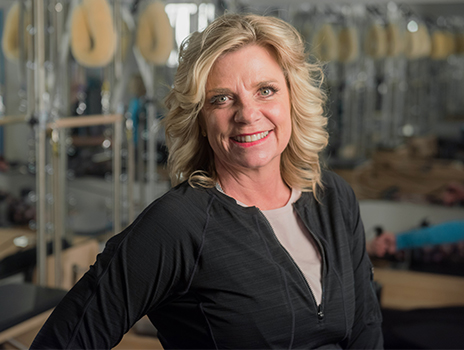- Home
- News Room
- Patient Stories Search Page
- Genetic Testing Leads to Precision Treatment for Colorectal Cancer
August 13, 2019
In 2015, Nickola Peterson had a lot on her mind. She and her husband, Les, were building a new house. She was planning her son’s high school graduation party, and she was teaching Pilates classes.
Preoccupied with a million details, Nickola forgot to pay attention to her own body.
“I was in a lot of pain, but kept telling myself it was just a pulled muscle or maybe appendicitis,” Nickola says. In May, her bloodwork revealed extremely low hemoglobin. She received an emergency blood transfusion and scheduled a colonoscopy the same week.
“That’s when they found a mass in my colon,” she recalls.
Nickola and Les put on happy faces for the graduation festivities that weekend. But on Monday, they began the daunting task of interviewing surgical oncologists. They chose Mazin Al-kasspooles, MD, at The University of Kansas Cancer Center.
Genetic testing reveals Lynch syndrome
Not only did Nickola have colon cancer, genetic testing of her tumor tissue revealed she had an underlying hereditary condition called Lynch syndrome. This familial cancer disorder arises when a gene that is supposed to repair damaged cells doesn’t work properly. When the faulty gene is passed from parent to child, there is an increased risk of developing colon cancer and other aggressive cancers, often before age 50. Nickola was 47.
In hindsight, Nickola said her father, Keith Westover, must have carried the faulty gene. He died of colon cancer in 1974, when he was 30. Treatment options were limited at the time. Fortunately, his daughter’s story has a much happier ending.
Precision treatment for colon cancer
At the cancer center, a multidisciplinary team collaborates to confirm each patient’s diagnosis and create a precise treatment plan. Part of the workup is staging the cancer. In most cases, tumors are staged 1 through 4.
“Based on her scans, we believed Nickola had advanced, stage 4 colon cancer,” says Dr. Al-kasspooles. “She had a large mass and the affected lymph node appeared to be sitting on an artery a fair distance from the colon cancer.”
The further the cancer metastasizes from the original tumor, the less curable it is. Medical oncologist Anup Kasi, MD, started Nickola on chemotherapy to shrink the tumor. He also recommended a targeted biologic treatment that had been shown to increase survival.
“In recent years, our ability to treat colon cancer has improved dramatically,” explains Dr. Al-kasspooles. “We look at the genetic makeup of the tumor, as well as the genetic makeup of the patient to precisely create an individualized treatment plan.”
After 3 months, tests revealed the systemic therapy was working. Nickola’s tumor was smaller and her bloodwork had improved. It was time for surgery.
Surgical surprise
During her operation, Nickola’s cancer diagnosis changed for the better. While removing the right half of her colon, Dr. Al-kasspooles discovered the affected lymph node was much closer to the tumor than her scans had indicated. That meant he could remove the cancer completely during surgery.
Dr. Al-kasspooles and his team were excited to tell Nickola and her family the good news. “We were able to downstage her cancer from 4 to 3. She would not require long-term chemotherapy after all. We could cure her,” he says.
Nickola was out of the hospital in record time ̶ 3 days.
“Nickola was heroic in how she handled her diagnosis and surgery,” says Dr. Al-kasspooles with a smile. “No matter what we told her was coming, she remained positive. She’s a real go-getter.”
High-risk surveillance
After surgery, Dr. Kasi prescribed another round of chemotherapy as a precautionary measure and referred her to the cancer center’s gastroenterology high-risk clinic. There, gastroenterologist Ajay M. Bansal, MD, and his team will continue to monitor Nickola for signs of cancer.
Dr. Kasi says Nickola’s colon cancer prognosis is good. “More than one year after surgery, she is still cancer-free. We hope the cancer does not return. If it does come back down the road, we have immunotherapy treatments we can use to combat the cancer. Surgery is not the only option for stage 3 cancer.”
Exceptional colon cancer care
Nickola was impressed with the level of care she received from everyone at the cancer center. Nurse practitioner, Erin Carroll, helped her deal with the side effects of chemotherapy. When pain medications did not diminish her neuropathy pain, Erin recommended acupuncture.
“It really helped,” Nickola says.
Throughout her experience, Nickola says she appreciated having 24/7 access to her electronic medical record through MyChart. A service of The University of Kansas Health System, MyChart allows patients to see their health records and communicate with their care team online.
“I could access it anytime, anywhere,” she says. “If I had questions, I could send the nurses an email through MyChart. They always got back to me very quickly.”
Interaction with other cancer patients helped, too. One patient shared seat belt cushions designed to make riding in cars more comfortable for those with chemo ports. In the infusion center, everyone cheered when a patient rang the bell signifying it was the last treatment. On January 27, 2017, it was Nickola’s turn to ring the bell.
Living with Lynch syndrome
Today, Nickola is back to her normal workout routine including yoga, Pilates and weightlifting. She was health-conscious before, but now she’s trying to do even better. “I avoid sugar, use natural products, pay attention to my stress level and focus on the positive,” she says.
Nickola’s 2 adult children also had genetic testing at the cancer center. Her daughter, Jessica, 23, did not inherit Lynch syndrome. Her son, Aaron, 20, did. Having Lynch syndrome does not mean Aaron is destined to develop cancer; it means he must be vigilant about cancer prevention, screenings and treatment. “Aaron already had his first endoscopy and colonoscopy. Everything was fine,” Nickola says.
Nickola encourages her family, friends and clients to pay attention to pain and have it checked by a physician. She also advises to never miss a screening.
“Some people complain about colonoscopies. But to me, 24 hours of discomfort is nothing in return for 365 days of living.”

Genetic testing and counseling
Genetic counselors at our nationally recognized cancer center identify and manage cancer risk through genetic testing and risk assessment.
As with all treatments, individual patient results vary. It is important to discuss your treatment options with your healthcare provider.
